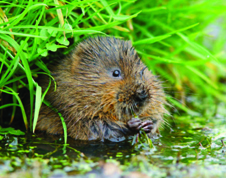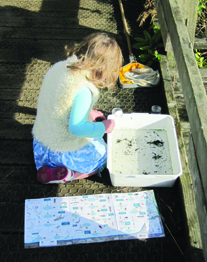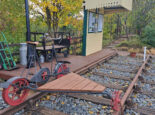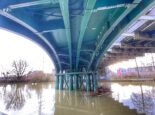Peterborough goes wild!

Peterborough may be the fastest growing city in the country but it still has plenty of green spaces and incredible wildlife to offer. The Go Wild! project, funded by the Caterpillar Foundation and run by the Wildlife Trust, is making the city connect with its wild side
The Go Wild! project is a positive force for Peterborough, engaging residents with the rich variety of wildlife to be found on our doorstep whilst helping to preserve those valuable fragments of wildlife-rich land that make the city such an attractive place to live. Since 2006 the project has offered literally thousands of people, schools and community groups an introduction to wildlife, nature reserves and their local Wildlife Trust. Rachel Price is Community Wildlife Officer at the Wildlife Trust BCN and is in charge of the project.
‘From the beginning the aim of Go Wild! has been to take people on a journey,’ she explains. ‘It offers a variety of ways in which local people can foster and further develop their interest in and love of nature. The ways of achieving this are very varied and include children’s wildlife clubs, practical conservation work, surveying for wildlife, events, developing local spaces and inspiring others to care.

Water voles have had a hard time of it over the years, but are making a strong comeback in many areas
Go Wild! encompasses anyone and everyone. ‘We do this with everything from large family events on the Wildlife Trust’s nature reserves to outreach projects that go into communities to engage with newer audiences who are perhaps not quite as comfortable with outdoor spaces. Then there are those who are really engaged – the specialist volunteers who want to form part of the team supporting the day-to-day work of the Wildlife Trust. At the root of it all is a desire to provide a better lot for wildlife in Peterborough while developing the chances for people to enjoy it.’
The project wouldn’t be possible without external funding, which comes exclusively from the Caterpillar Foundation, which champions programmes that support education, the environment and emergency relief. The Foundation operates throughout the world and is dedicated to transforming lives in the communities around Caterpillar’s facilities, including the manufacturing site for Perkins engines here in Peterborough. The result for our city has been nine years of committed investment in its natural environment. The project is currently halfway through its latest three-year phase, which runs until summer 2016.
Community outreach
At the core of Go Wild! is community outreach. ‘This includes working with local groups who perhaps have a local community green space – a village green, city space or perhaps school grounds – that they want to see improved. We can help them enhance the wildlife interest while making that space a nicer place for people to enjoy.’ Many spaces start off as close-mown grassland with very little else. The Go Wild! team can help with everything from the creation of ponds to wildflower meadows and new woodland. The team brings its wildlife specialism and works with other partners for the non-wildlife elements, or advises on grants that community groups can apply for. In this way green spaces are transformed for the benefit of both people and wildlife. A good example of Go Wild!’s work in this respect is at Ravensthorpe Primary School where, in consultation with pupils and staff, a number of project areas were identified within the school’s grounds. Rachel and her team helped to develop a pond then ran pond-dipping and bug-hunting sessions. A full maintenance plan for the site was written so that staff can maintain and develop both its wildlife interest and educational value. To maintain momentum Go Wild! is now helping the school find parent volunteers to champion the project within the school and drive forward future ideas such as a mini-orchard and marsh garden.
Learning and growing
At Barnack Hills and Holes nature reserve on the edge of Barnack village Go Wild! has helped to set up a ‘friends of’ group for this mediaeval quarry that is now home to half the surviving limestone grassland in Cambridgeshire. Launched in April, the group will strengthen the sense of local ownership of the site as well as helping with its day-to-day management. Back in the city the project is facilitating the creation of a wildlife pond and meadow areas at the East of England Showground.
One of the more unusual projects is at St Botolph’s Church in Longthorpe, where the church community wanted to know how they could improve their churchyard. ‘Old churchyards are often fantastic wildlife resources, especially for things like lichens and mosses,’ explains Rachel. ‘We did a lichen survey and found a nationally rare lichen right there in the churchyard. One of the country’s leading lichenologists then led a lichen safari with another local lichen enthusiast. On the back of that we’ve made recommendations about the management of the site to include conservation of the lichens, as well as proposing creating areas of wildflowers and increasing the number of hedges.’
Ongoing monitoring and regular bug hunts will help people to connect with the nature to be found there. Ensuring a project’s ongoing sustainability is important so that it can eventually find its feet and continue with much-reduced support from Go Wild!. Achieving this might involve, for example, helping groups to build their skills and confidence through on-site training or by attending one of the Wildlife Trust’s training workshops. Rachel and her team can work with interested individuals to help them engage with the wider community in order to find out who else would like to be involved and in what capacity, showcasing what’s on offer with open days or practical sessions.
Discovering nature
An important part of Go Wild!’s impact is in engaging more people, adults and schoolchildren, with their local nature reserves and the Wildlife Trust’s work in the area. As well as family events on Wildlife Trust nature reserves, the project runs events on other green sites throughout the city, such as Railworld’s Wildlife Haven and Central Park. A stall at Peterborough University’s freshers’ event to promote volunteering opportunities through Go Wild! saw a number of students register their interest. Schools are encouraged to value their grounds as a learning resource. ‘We want them to be seen as an outdoor classroom for all elements of the curriculum, not just science,’ adds Rachel. ‘We’ve also worked on a self-led teachers’ pack for Woodston Ponds Nature Reserve by the River Nene. Aimed at Key Stage Two teachers, the pack encourages local schools to use the reserve as a source of educational inspiration, with activities including bird watching, pond dipping and tree bingo. It means that rather than having to hop on an expensive coach, schoolchildren can explore their own local wildlife space, contrasting it with a massive reserve such as Great Fen Project. Crucially, it introduces them to a space they can go back to with their families, often on foot.’
Go Wild! is also opening the door for committed wildlife enthusiasts to help out in the practical work involved in looking after a nature reserve. Volunteers can get their hands dirty coppicing, hedge laying or maintaining paths, for example – all valuable work to improve habitats and access to the Wildlife Trust’s nature reserves across Peterborough, including Thorpe Wood and Dogsthorpe Star Pit. The recent establishment of the thriving Peterborough Local Group, a city-wide volunteer group allied with the Trust, has launched a series of monthly walks and talks and the chance to promote other opportunities to get involved in Go Wild!’s work. ‘We have been training people to do water vole surveys and are looking to train volunteers in monitoring the success of coppicing at Grimshaw Wood in Bretton as a means of future management.’
Clearly the Go Wild! project is having a profound impact across Peterborough: new spaces for wildlife are being created, green spaces are being transformed, and people from all walks of life are discovering the natural world that’s all around them. The future of the city’s wildlife is promising.
Contact Wildlife Trust BCN on 01954 713500 or vist www.wildlifebcn.org
This article has been supported by Peterborough-based Perkins Engines Company Limited, one of the world’s leading suppliers of off-highway diesel and gas engines.

















